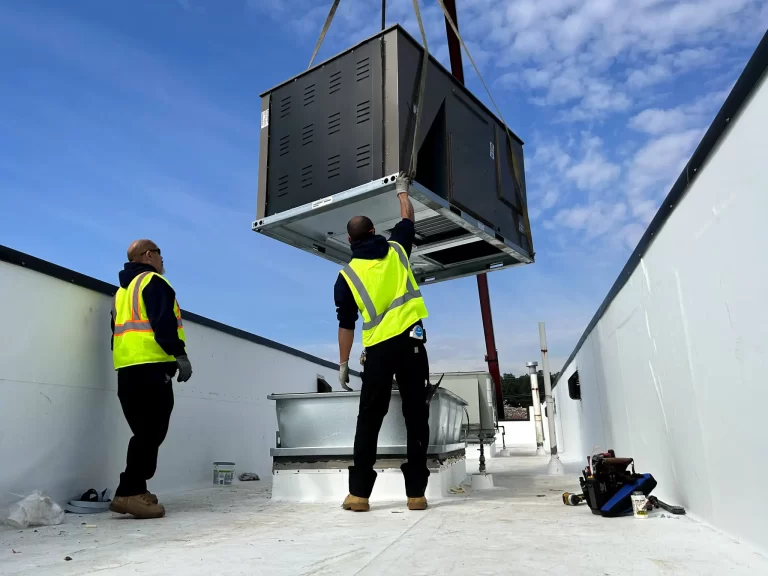Indoor air quality is an important aspect of our overall well-being, yet it often goes unnoticed. Many people are unaware of the potential health risks associated with poor indoor air quality and the impact it can have on their daily lives. This article aims to shed light on the subject and provide practical solutions for improving indoor air quality in Potomac Falls.
Understanding Indoor Air Quality
Before delving into the solutions, let’s first explore what indoor air quality is and why it matters. Indoor air quality refers to the quality of the air within and around buildings, specifically regarding the health and comfort of the occupants. Poor indoor air quality can lead to various respiratory issues, allergies, and other health concerns.
Indoor air quality is not something that should be taken lightly. It is estimated that the average person spends about 90% of their time indoors, whether it be at home, in the office, or in other indoor environments. With such a significant amount of time spent indoors, it is crucial to ensure that the air we breathe is clean and free from pollutants.
The Importance of Good Indoor Air Quality
Good indoor air quality is crucial for our overall well-being. We spend a significant amount of time indoors, especially in our homes, where we expect to feel safe and comfortable. Poor indoor air quality can have both short-term and long-term effects on our health, ranging from minor irritations to more severe respiratory conditions. Therefore, it is essential to prioritize and maintain good indoor air quality.
When we think about air pollution, we often associate it with outdoor environments. However, studies have shown that indoor air can be even more polluted than outdoor air. This is due to a variety of factors, including inadequate ventilation, the presence of indoor pollutants, and the accumulation of allergens and irritants.
Poor indoor air quality can have immediate effects, such as headaches, fatigue, and irritation of the eyes, nose, and throat. In the long term, it can contribute to the development or worsening of respiratory conditions, such as asthma and allergies. Additionally, exposure to certain indoor pollutants has been linked to more serious health issues, including cardiovascular disease and even cancer.
Common Indoor Air Pollutants in Potomac Falls
Potomac Falls, like any other region, faces its share of common indoor air pollutants. These pollutants can originate from various sources, such as pet dander, dust mites, volatile organic compounds (VOCs) from cleaning products and furniture, as well as mold and pollen. It is important to be aware of these pollutants to address them effectively and improve indoor air quality.
Pet dander is a common indoor air pollutant, especially for households with furry companions. As pets shed their fur and dander, these particles can become airborne and circulate throughout the indoor environment. For individuals with allergies or asthma, exposure to pet dander can trigger symptoms and worsen respiratory conditions.
Dust mites are microscopic creatures that thrive in warm and humid environments. They feed on dead skin cells and can be found in bedding, upholstered furniture, and carpets. Dust mite droppings contain allergens that can become airborne and cause allergic reactions, particularly in individuals with dust mite allergies.
Volatile organic compounds (VOCs) are chemicals that can be emitted as gases from various sources, including cleaning products, paints, adhesives, and furniture. These compounds can have both short-term and long-term health effects, ranging from eye, nose, and throat irritation to more serious conditions, such as liver and kidney damage.
Mold and pollen are also common indoor air pollutants that can have a significant impact on indoor air quality. Mold can grow in damp and poorly ventilated areas, such as bathrooms and basements, and release spores into the air. Exposure to mold spores can cause allergic reactions and respiratory issues. Pollen, on the other hand, can enter indoor spaces through open windows and doors, and trigger allergies in susceptible individuals.
By understanding the common indoor air pollutants in Potomac Falls, residents can take proactive measures to reduce their exposure and improve indoor air quality. This can include regular cleaning and dusting, proper ventilation, using air purifiers, and addressing any moisture issues that may contribute to mold growth.
Assessing Your Indoor Air Quality
Identifying whether your indoor air quality is poor is the first step towards improving it. There are several signs that can indicate poor indoor air quality:
Signs of Poor Indoor Air Quality
- Increased instances of allergies or respiratory issues
- Excessive dust accumulation throughout the space
- Unpleasant or lingering odors
- Mold growth or visible signs of water damage
- Consistently high humidity levels
If you notice any of these signs, it is crucial to take action to improve the indoor air quality of your home. One effective way to assess the air quality is through professional air quality testing.
Professional Air Quality Testing
Professional air quality testing involves analyzing the air within your home to identify pollutants and their concentrations. This testing provides valuable insights into potential problems and helps determine the appropriate solutions for improving indoor air quality. Consider consulting a professional to conduct thorough air quality testing for your home in Potomac Falls.
Solutions for Improving Indoor Air Quality
Fortunately, there are several solutions available for improving indoor air quality. Here are some effective methods:
Air Purifiers and Filters
Air purifiers and filters are devices designed to remove pollutants from the air. They work by trapping particles and filtering out contaminants, making the air cleaner and healthier to breathe. Consider investing in an air purifier or incorporating air filters into your HVAC system to enhance indoor air quality.
Humidity Control Solutions
Excessive humidity levels can contribute to indoor air quality problems, as they create favorable conditions for mold growth and increase the spread of allergens. Installing a dehumidifier or using ventilation fans in areas prone to excess moisture, such as bathrooms and kitchens, can help control humidity and improve indoor air quality.
Ventilation Improvements
Proper ventilation is essential for maintaining good indoor air quality. It helps remove stale air, pollutants, and odors while bringing in fresh air from outside. Consider enhancing ventilation by opening windows, installing exhaust fans, or utilizing mechanical ventilation systems to ensure a constant flow of fresh air throughout your home.
Maintenance for Sustained Air Quality
Maintaining good indoor air quality is an ongoing effort that requires regular maintenance. Here are some important maintenance tasks:
Regular Cleaning and Dusting
Frequent cleaning and dusting help reduce the accumulation of allergens and dust particles in your home. Vacuuming carpets, dusting surfaces, and washing bedding regularly are simple yet effective ways to maintain better indoor air quality.
HVAC System Maintenance
Your HVAC system plays a crucial role in maintaining indoor air quality. Regular maintenance, such as cleaning or replacing filters, cleaning air ducts, and scheduling professional inspections for proper functioning, ensures that your HVAC system contributes to clean and healthy indoor air.
The Role of Plants in Improving Indoor Air Quality
Plants not only add beauty and freshness to your home but can also play a significant role in improving indoor air quality. Some plants are known for their air-purifying properties and can help remove certain pollutants from the air.
Best Indoor Plants for Air Purification
Some of the best indoor plants known for their air-purifying qualities include the Snake Plant, Spider Plant, Peace Lily, and Aloe Vera. These plants are relatively low-maintenance and can effectively absorb pollutants while releasing oxygen, contributing to better indoor air quality.
Care and Maintenance of Indoor Plants
To maximize the benefits of indoor plants for air purification, it is important to understand their care requirements. Ensure they receive adequate sunlight, water them appropriately, and periodically clean their leaves to prevent dust buildup. With proper care, indoor plants can thrive and contribute to healthier indoor air.
Improving indoor air quality in Potomac Falls is crucial for the well-being of you and your family. By understanding the importance of good indoor air quality, assessing your air quality, implementing effective solutions, and maintaining regular upkeep, you can create a healthier and more comfortable living environment.


